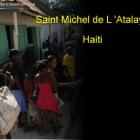MINUSTAH troops and the Children they left behind in Haiti
ADVERTISEMENT
While the United Nations has a policy to facilitate claims of paternity and claims for child support, the process is often long and arduous. The seven mothers taken to Port-au-Prince for paternity tests in February are still waiting for the results.
According to the UN, while they do play a part, it is incumbent on the peacekeeper's country of residence to decide on an outcome. The UN may ask that DNA samples be given, but the establishment of paternity is then met by what the country's court decides.
Despite the fact that the UN and many armies state that they forbid these relationships, the problem persists. It is a matter of consensuality. The relationships are never considered equal because the peacekeepers have power in the food, money, water and security they provide. Despite the mother's given consent, the relationship is considered exploitative.
The UN only began their system for substantiating claims of paternity last year. Adding the fact that many women don't know about this system, their chance at getting support is very slim. Most are living in poverty and don't have the means to support their child. They turn then to MINUSTAH for help.
Read more: MINUSTAH, International
« Florida students learning English can now wait two years before standardized test | Main | Breaking news - Les Freres Florestal, Enol et Joshua Florestal, soti nan prison Jodia »
Leave a Reply
Name (required) E-mail (required, will not be published)
» »
Our objective is to share with you news and information about Haiti and the people of Haiti. Traditions, habits and the way we were or grew are alive in this site. We highly recommend that you Subscribe to our Newsletter and also share with us some of the things that are memorable and made us unique people.


 Haitian Thanksgiving
Haitian Thanksgiving  Saint Marc, Haiti
Saint Marc, Haiti  Maissade, Haiti
Maissade, Haiti  Saint Michel de L 'Atalaye
Saint Michel de L 'Atalaye  Informative Marketing and Advertising in the Haitian Community
Informative Marketing and Advertising in the Haitian Community